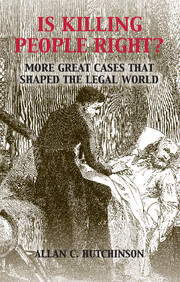Book contents
- Frontmatter
- Dedication
- Contents
- List of figures
- Preface
- 1 Introduction: on the road (again)
- 2 Is killing people right?: law and the end of life
- 3 Oil on troubled waters: the consequences of civil liability
- 4 The politics of law: cats, pigeons and old chestnuts
- 5 The companies we keep: the moralities of business
- 6 Fifty shades of Brown: consent and the criminal law
- 7 Putting up a defence: sex, murder and videotapes
- 8 Wade-ing into controversy: a case of accidental activism
- 9 Playing a different tune: fairness in deal making
- 10 Conclusion: surfing the tides
- Sources
- Index
- References
7 - Putting up a defence: sex, murder and videotapes
Published online by Cambridge University Press: 05 May 2016
- Frontmatter
- Dedication
- Contents
- List of figures
- Preface
- 1 Introduction: on the road (again)
- 2 Is killing people right?: law and the end of life
- 3 Oil on troubled waters: the consequences of civil liability
- 4 The politics of law: cats, pigeons and old chestnuts
- 5 The companies we keep: the moralities of business
- 6 Fifty shades of Brown: consent and the criminal law
- 7 Putting up a defence: sex, murder and videotapes
- 8 Wade-ing into controversy: a case of accidental activism
- 9 Playing a different tune: fairness in deal making
- 10 Conclusion: surfing the tides
- Sources
- Index
- References
Summary
The legal profession is not the most beloved of vocations. From Plato through William Shakespeare and Charles Dickens to Tom Wolfe and John Grisham, literature attests to its impugned status. Matters are not much different in real life. In the public's mind, lawyers are perceived as being not only adept at the dubious arts of manipulation and double dealing but also moral hypocrites because they defend these practices in the brazen name of ‘professional ethics’. Along with used car dealers and telemarketers, lawyers are considered to be among the least trustworthy and least respected of all professionals. Lord Bolingbroke's assessment of the legal profession several centuries ago remains true today: ‘the profession of law, in its nature the noblest and most beneficial to mankind, is in its abuse an abasement of the most sordid and pernicious kind’.
If the legal profession at large suffers from bad press, the criminal bar is the butt of the most insistent criticism. The ethical history of criminal lawyering is populated by a cast of colourful characters – from the ennobled image of Clarence Darrow to the more dubious persona of Johnnie Cochrane. People tend to identify defence lawyers with their unsavoury clients and their unforgivable deeds. However, when individuals are in trouble, they want the best and most dogged lawyers on their side and their side alone; they need to be assured about the unquestioned loyalty of their lawyer to their cause. Whatever the rap against the legal profession generally, accused persons want their lawyer to do all that they can to raise every issue and argument in an uncompromising way that affords them every chance of acquittal.
This push and pull puts criminal defence lawyers in an ethical and professional bind. They must juggle competing obligations to their clients, the courts, the legal profession and the public interest. And this is no mean feat. Often misunderstood in actions and motivations, criminal lawyers are there to defend their clients, not to judge them. Indeed, the mantra of the defence bar is that they ‘lend their exertions to all, and themselves to none’. Because accused persons are presumed innocent and entitled to a fair trial, the lawyer is required to challenge the Crown's case in the most vigorous and partial way.
- Type
- Chapter
- Information
- Is Killing People Right?More Great Cases that Shaped the Legal World, pp. 95 - 113Publisher: Cambridge University PressPrint publication year: 2016



